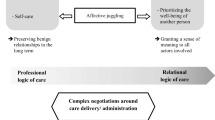Abstract
This paper aims at addressing some questions considering the conflicting normative claims of partiality, i.e. to provide for the caring needs of the particular patient, and impartial claims of treating all patients with a relevant need equally. This ethical conflict between different conceptions of moral responsibilities within professional ethics relates to debates between an ethics of care and an ethics of justice. An ethics of care is a particularistic position that endorses some form of partiality, i.e. favouring persons to whom one stands in particular relationships. This paper argues that also a professional ethics must endorse some kind of partiality at the clinical level of health care. In fact, consideration of care for particular patients is a prerequisite for giving proper and attentive care towards the individual patient. This paper will discuss how partial concerns might be balanced against claims of distributive justice within the frame of the formal principle of justice. It is concluded that there is an urgent need for the recognition of the consequences of macro-level decisions for the possibility of the discharge of moral responsibility on a clinical level of health care. This would mean that health care institutions should adapt for the possibility of a basic standard of proper care and attention for the individual patient.
Similar content being viewed by others
Notes
Partiality is here understood as giving higher priority to the caring needs of those patients to whom the health care professional is either relationally or spatiotemporally close, than to those patients to whom the health care professional is not relationally or spatiotemporally close, everything else being equal.
The notions of ‘principle of formal justice’ and ‘material principle’ will be explained at page 12.
Agent-relative concerns are opposed to agent-neutral concerns, and are moral concerns that are related to the moral participant, his/her preferences, desires, and obligations. Agent-neutrality is most frequently explained in terms of agent-neutral reasons. Agent-neutral reasons can be described as follows: “If a reason can be given a general form which does not include an essential reference to the person who has it, it is an agent-neutral reason. For example, if it is a reason for anyone to do or want something that it would reduce the amount of wretchedness in the world, then that is a neutral reason” [12, pp. 152–153]. Agent neutrality is therefore an important aspect for impartiality, whereas agent relativity might provide reasons for particularism and partiality.
References
Applbaum, A. I. (1999). Ethics for adversaries: The morality of roles in public and professional life. Princeton, NJ: Princeton University Press.
Blum, L. (1994). Moral perception and particularity. Cambridge: Cambridge University Press.
Botes, A. (2000). A comparison between the ethics of justice and the ethics of care. Journal of Advanced Nursing, 32(5), 1071–1075.
Feinberg, J. (1973). Social philosophy. Englewood Cliffs, N.J.: Prentice-Hall.
Førde, R., Pedersen, R., Nortvedt, P., & Aasland, O. G. (2006). Får eldreomsorgen nok ressurser? Tiddskrift for den Norske Lægeforening, 126(15), 1913–1916. (Norwegian).
Gilligan, C. (1982). In a different voice: Psychological theory and women’s development. London: Harvard University Press.
Goodin, R. E. (1985). Protecting the vulnerable: A reanalysis of our social responsibilities. Chicago: The University of Chicago Press.
Gosepath, S. (2001) Equality. In: The stanford encyclopedia of philosophy. http://plato.stanford.edu/entries/equality/.
Held, V. (2006). The ethics of care: Personal. Political, and Global. New York: Oxford University Press.
Jacobs, F. (2005). Reasonable partiality in professional ethics: The moral division of labour. Ethical Theory & Moral Practice, 8(1/2), 141–154.
Koehn, D. (1994). The ground of professional ethics. London: Routledge.
Nagel, T. (1986). The view from Nowhere. New York: New York University Press.
Nordhaug, M. (2004). Mellom omsorgshensyn og fordelingsrettferdighet: sykepleie i et prioriteringsetisk dilemma. (Nursing care and distributive justice—nursing in an ethical dilemma of priority). Master thesis. Oslo: University of Oslo (Norwegian).
Nortvedt, P. (1996). Sensitive judgment: Nursing, moral philosophy and an ethics of c. Tano Aschehoug: Oslo.
Nortvedt, P. (2007). Care, sensitivity and “the moral point of view”. In C. Gastmans, K. Dierickx, H. Nys, & P. Schotsmans (Eds.), New pathways for European bioethics (pp. 81–97). Antwerpen: Intersentia.
Nortvedt, P., & Nordhaug, M. (2008). The principle and problem of proximity in ethics. Journal of Medical Ethics, 34, 156–161.
Nortvedt, P., Pedersen, R., Grøthe, K. H., Nordhaug, M., Kirkevold, M., Slettebø, Å., et al. (2008). Clinical prioritisations of healthcare for the aged—professional roles. Journal of Medical Ethics, 34, 332–335.
Oakley, J., & Cocking, D. (2001). Virtue ethics and professional roles. New York: Cambridge University Press.
Pedersen, R., Nortvedt, P., Nordhaug, M., Slettebø, Å., Grøthe, K. H., Kirkevold, M., et al. (2008). In quest of justice? Clinical prioritisation in healthcare for the aged. Journal of Medical Ethics, 34(4), 230–235.
Pettersen, T. (2006). Omsorg som etisk teori. Norsk Filosofisk Tidsskrift, 2, 151–163. (Norwegian).
Pettersen, T. (2008). Comprehending care: Problems and possibilities in the ethics of care. Lanham, Md.: Lexington Books.
Scheffler, S. (2001). Boundaries and allegiances: Problems of justice and responsibility in liberal thought. New York: Oxford University Press.
Williams, B. (1973). Consequentialism and integrity. In J. J. C. Smart & B. Williams (Eds.), Utilitarianism: for and against (pp. 82–118). Cambridge: Cambridge University Press.
Woodward, V. (1999). Achieving moral health care: The challenge of patient partiality. Nursing Ethics, 6(5), 390–398.
Woolhead, G., Tadd, W., Boix-Ferrer, J. A., Krajcik, S., Schmid-Pfahler, B., Spjuth, B., et al. (2006). “Tu” or “Vous?” A European qualitative study of dignity and communication with older people in health and social care settings. Patients Education and Counseling, 61(3), 636–671.
Author information
Authors and Affiliations
Corresponding author
Rights and permissions
About this article
Cite this article
Nordhaug, M., Nortvedt, P. Justice and Proximity: Problems for an Ethics of Care. Health Care Anal 19, 3–14 (2011). https://doi.org/10.1007/s10728-010-0159-3
Published:
Issue Date:
DOI: https://doi.org/10.1007/s10728-010-0159-3




